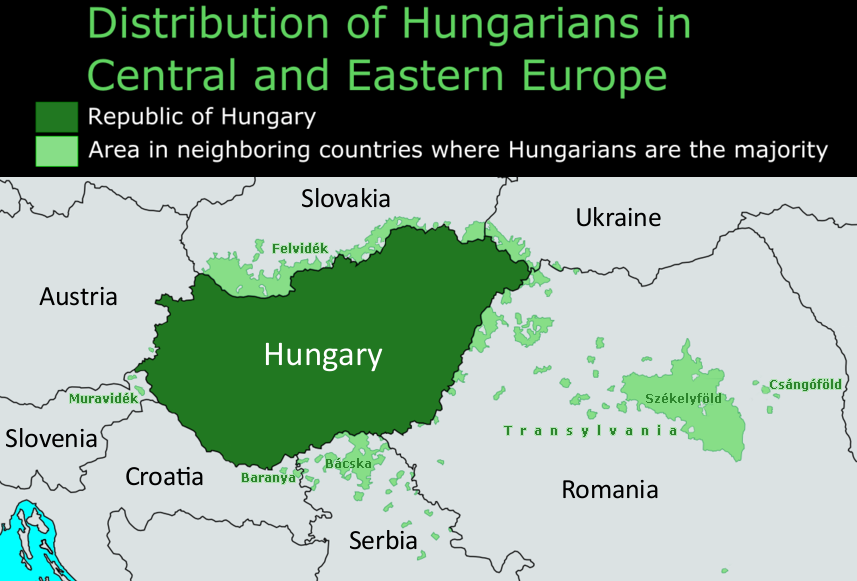Hungarian Assimilation
Hungarians have been emigrating in large numbers since the 19th century. But my impression is they assimilate very quickly into the local population. Hungarian restaurants are relatively few outside Hungary. Parents don't usually send their foreign-born kids off to a cultural center to learn Hungarian. And is there a "Little Budapest" anywhere?
Why?
zif wrote:Hungarians have been emigrating in large numbers since the 19th century. But my impression is they assimilate very quickly into the local population. Hungarian restaurants are relatively few outside Hungary. Parents don't usually send their foreign-born kids off to a cultural center to learn Hungarian. And is there a "Little Budapest" anywhere?
Why?
It's a good question.
I've met quite a few ethnic Hungarians over the years particularly those who are the children of those that left in 1956.
They seem to fall into 2 categories - those that cut all all ties with Hungary, not even sharing the language with their kids and those that gave their children knowledge of the language and culture in varying degrees.
I suppose if the communist regime had really interfered in your life and brutally treated you, you aren't going to look upon it in any way as benign and you'd want to forget. And I suppose it didn't seem like it was ever going change or that there would be an advantage for your children to know about where you came from.
Don't know about the more recent departures. We know some of them too. I suspect they do pass on the culture but it's a little too soon to know unless they left in the early 1990s.
If I think about my own experiences, Mrs F and I have made a serious effort for our kids to be bilingual and to know about both HU and UK culture. Even with that, I can see gaps in the kids knowledge about my homeland. On the other hand the Internet and regular (pre-pandemic) visits fills in quite a bit for them. It's not quite the same as living there.
I've seen Hungarian restaurants in diverse places - London of course. Perhaps the most obscure was a restaurant run by Hungarians in The Gambia. It was pretty good but I think it's no longer there.
zif wrote:Hungarians have been emigrating in large numbers since the 19th century. But my impression is they assimilate very quickly into the local population. Hungarian restaurants are relatively few outside Hungary. Parents don't usually send their foreign-born kids off to a cultural center to learn Hungarian. And is there a "Little Budapest" anywhere?
Why?
Our son was born in the USA but he attened a pre school that was run by a Hungarian church in Ca.
It was all in English but the church ran the day care center.
In L.A. we went once a year the The Alpine Village. Hungarians rented the place out for a weekend every year.
Most of the folk dancers were American born children of Hungarians. They were very good and even came to perform in Hungary.
There are many shops to purchse Hungarian foods and even sauages made in the US.
Our son know alot about Hungarian history from pangan days till now. He is proud to be Hungarian actually.
He lives in Japan but is open to coming back to Hungary and retiring here.
In NYC there used to be in the 1970's a few blocks of streets that were ,
"Hungarian Town" restaurants,shops all run by Hungarians who spoke Hungarian .
From my exerince most Hungarians do assimillate but they also never forget their roots and pass their customs onto their children.
Most of our HU born friends live in Hawii and all of their children speak Japanese and Hungarian besides English.
Many send their children to Hungary every year to visit relations .
There are an estimated 14.2–14.5 million ethnic Hungarians and their descendants worldwide, of whom 9.6 million live in today's Hungary (as of 2016).
Canada: 348,085 (2016)
United States: 1,437,694 (2013)
Mexico: 3,500 (2006)
About 2.2 million Hungarians live in areas that were part of the Kingdom of Hungary before the Treaty of Trianon in 1920 and are now parts of Hungary's seven neighbouring countries, Slovakia, Ukraine, Romania, Serbia, Croatia, Slovenia, and Austria.
Significant groups of people with Hungarian ancestry live in various other parts of the world, most of them in the United States, Canada, Germany, France, the United Kingdom, Brazil, Australia and Argentina.
More information can be found here
SimCityAT wrote:There are an estimated 14.2–14.5 million ethnic Hungarians and their descendants worldwide, of whom 9.6 million live in today's Hungary (as of 2016).
Canada: 348,085 (2016)
United States: 1,437,694 (2013)
Mexico: 3,500 (2006)
About 2.2 million Hungarians live in areas that were part of the Kingdom of Hungary before the Treaty of Trianon in 1920 and are now parts of Hungary's seven neighbouring countries, Slovakia, Ukraine, Romania, Serbia, Croatia, Slovenia, and Austria.
Significant groups of people with Hungarian ancestry live in various other parts of the world, most of them in the United States, Canada, Germany, France, the United Kingdom, Brazil, Australia and Argentina.
Apparently there's a cluster of Hungarians in Darmstadt, Germany. I was told that by an ethnic Hungarian from there. No idea if that's really true.
Mrs F and I went to Florida and met some Hungarian speakers on an air boat tour in the Everglades. I think they were from Texas.
You can find Hungarins everywhere.
My 3/4 Mohawk unlce ( mom's half bro) married a 15 year old Hungarian who just got off the boat with her parents.
Have 2nd cousins how are HU, Native and Puerto Rican, talk about diverse.
Had a friend a year oder then me in school. I was 16 she 17.
She arrived in the US at age 2 from Budapest with her family in 1956.
she was very American but everything I was at her hme her mom only spoke Hungarian, was always trying to feed me something but my friend would hush her away while speaking in Hungarian to her mother.
Even my step- mother was born to Hungarian parents.
Out of all the people in S. Ca. I found a Hungarian to marry.
They are everywhere!
They are Marilyn, but there are pockets of them in different countries.
SimCityAT wrote:They are Marilyn, but there are pockets of them in different countries.
Several years back in Las Vegas we had a slightly uncomfortable situation.
We were speaking with the manager of an apt. we wished to rent.
She looked at my husband and her attitude changed for a split second or two.
She said rather irratated the her ex- husband was Hungarian.
I thought, oh great now we have to keep searching for a place...
I must of charmed her because we got the flat but it was questionable for a min or two.
That's fascinating about Hungarian Town in NYC. I didn't about it.
zif wrote:That's fascinating about Hungarian Town in NYC. I didn't about it.
Link? Couldn't see it referenced in the replies.
fluffy2560 wrote:zif wrote:That's fascinating about Hungarian Town in NYC. I didn't about it.
Link? Couldn't see it referenced in the replies.
I should have Googled first. Here's an interesting article about Hungarian resources in New York City:
https://dailynewshungary.com/great-hung … york-city/
SimCityAT wrote:fluffy2560 wrote:zif wrote:That's fascinating about Hungarian Town in NYC. I didn't about it.
Link? Couldn't see it referenced in the replies.
Thanks! It's interesting.
Some years ago, one of my UK relatives mentioned coming across Hungarian things in London - mainly one or more restaurants and some street food (Langos) but I don't remember where it was.
Hungarians we used to know in the UK weren't attached to an area but were spread out across the place and not very interconnected as far as we were aware. Not like Indian, Pakistani or Chinese communities where they can be clustered together.
I only knew one Hungarian and that was because I worked with her. Working in the hospitality industry all my life I came across many people, Italians, French, German, South African, Portuguese just to name a few and as worked all over the place, thinking about it now it's surprising that I didn't come across any other Hungarians.
My sister's first husband was Chinese and you are right they do keep to themselves.
zif wrote:That's fascinating about Hungarian Town in NYC. I didn't about it.
This was in 1975, not sure about the area now days.
It was really fun though, all sorts of places to grab some Hungarian food from self serve shops.
NYC is interesting, I liked it but don't think I could live there forever.
In Ca,my then young husband and his friends would sometimes go to Hungarian events at some community center. Most of the people came over in 1956 and thought my husband and friends to be just some odd Hippie dudes.
My husband said most were locked in time, they still addressed each other in formal terms like, Sir and Lord, guess they were former aristocrates or former big shots.
Marilyn Tassy wrote:....
My husband said most were locked in time, they still addressed each other in formal terms like, Sir and Lord, guess they were former aristocrates or former big shots.
I hear this all the time when I'm walking the dog. Whoever we meet, it depends on the age of the person and just their state of mind at the time.
And as we all know, the safe bet is "jó napot kívánok" rather the "sziasztok".
But it just depends on the person and one has to shoot from the hip. I'm not entirely sure how you size them up for the greeting. Yesterday, we got a mixture of both including from people who I'd have labelled more formal. Dogs have no formality - they go straight to what's important!
My neighbours are a good example (ok, not sniffing each other!). On one side, one of them is a Szia person (mid-50s) and the other a "jó napot" type (over 70). But my neighbours opposite - in their 70s - are "Szia".
Mrs F says this is fairly normal and you have to judge on the fly. I have no feel for it but Mrs F does.
Reminds me of Helmut Kohl, former German Chancellor, saying to Margaret Thatcher, then UK Prime Minister saying, "you can say You to me". It was talked about widely. Duzen or Siezen, a constant question here and there.
In English the differences aren't structured like many languages, but there's certainly formal and informal speech and you instinctively know how to pitch it depending on the situation.
zif wrote:In English the differences aren't structured like many languages, but there's certainly formal and informal speech and you instinctively know how to pitch it depending on the situation.
These people at the Hungarian community center were more the being polite with each other.
I am not sure how to spell it in Hungarian but it is something like,"namish' at least that's how it sounds.
It is a way of addressing someone with ,"royal" birth or status.
My husband thought it was insane in the setting of being in the USA.
I know of a Hungarian bakery located in Tarzana , Ca.
Man, the BEST seedless rye on earth.
Was run at the time by an eldery Jewish Hungarian lady.
The bread was twice as pricey as from a grocery store but well worth every penny.All wonderful Hungarian pastries and rolls.
Best ever.
I'd take my toddler son into the shop with me, had to take numbers it was so busy.
Everytime Bea, the baker or one of her staff would hand little children out those nice black and white cookies, they were huge too. Felt like a nice family shop where you were also welcome.
I can't find bread even half as good here in Hungary.
I won't even discuss their cakes... Just the very best, better then any I've had here in Hungary.
During the holidays you would have to pre order sweets and treats, the place was so popular.
Bea must of had a knack for baking for sure.
Good bread is becoming a sad memory just about everywhere. Even in France you frequently get the factory stuff from what looks like a bakery.
I sometimes feel like Winston in 1984 mourning all the things that used to be.
zif wrote:Good bread is becoming a sad memory just about everywhere. Even in France you frequently get the factory stuff from what looks like a bakery.
I sometimes feel like Winston in 1984 mourning all the things that used to be.
Bread,I wish I could bake my own but that's not a skill I have.
Even my old bread machine never was very good.
I do remember going crazy in 1978 over the great bread here in Hungary.
Now it's horrid. Full of fluffy air with no taste.
My husband is always lamenting the old days of rich cream and good bread and butter here.
Marilyn Tassy wrote:zif wrote:Good bread is becoming a sad memory just about everywhere. Even in France you frequently get the factory stuff from what looks like a bakery.
I sometimes feel like Winston in 1984 mourning all the things that used to be.
Bread,I wish I could bake my own but that's not a skill I have.
Even my old bread machine never was very good.
I do remember going crazy in 1978 over the great bread here in Hungary.
Now it's horrid. Full of fluffy air with no taste.
My husband is always lamenting the old days of rich cream and good bread and butter here.
Bread is very easy to make, you don't need a machine.
Marilyn Tassy wrote:zif wrote:Good bread is becoming a sad memory just about everywhere. Even in France you frequently get the factory stuff from what looks like a bakery.
I sometimes feel like Winston in 1984 mourning all the things that used to be.
Bread,I wish I could bake my own but that's not a skill I have.
Even my old bread machine never was very good.
I do remember going crazy in 1978 over the great bread here in Hungary.
Now it's horrid. Full of fluffy air with no taste.
My husband is always lamenting the old days of rich cream and good bread and butter here.
Since we've been in Hungary, we've had three bread machines. First one broke some years ago, no idea why. We got one from Mrs F's mother as she didn't use it. The motor seized up and was retired to the electrical recycling.
Now we're on another one inherited from my mother. It's quite sophisticated with digital this and that. However, Mrs F doesn't really make bread in it but makes pizza dough. It's quite good at that I must say.
My eldest daughter just went back home and she said Hungarian bread was a lot better than UK bread. I agree! I am sure they use far fewer chemically type ingredients. That's the upside but it does reduce its shelf life.
SimCityAT wrote:...
Bread is very easy to make, you don't need a machine.
Saves a lot of time though - all that kneading and rising can go automatic.
Maybe the grains to make bread are not like they used to be.
I know many crops are loaded with glyphosate.
The Roundup weed killer kills more then weeds.
There was news about many race hrsed in in the US just breaking down mid course.
Having to be put down right then and there.
Research was that even though the owners spared no cost taking care of the horses the feed was loaded with glyphosate.
Their joints just broke down.
Corp. farming is killing us all.
My German grandfather ate a simple diet for all of his nearly 95 years.
Only rye bread, saurkraut and a few shots of whiskey per day.
He was always thin but fit.
Marilyn Tassy wrote:...
My German grandfather ate a simple diet for all of his nearly 95 years.
Only rye bread, saurkraut and a few shots of whiskey per day.
He was always thin but fit.
I like the sound of that diet.
My Dad is 97. During the war and afterwards he was a smoker and boozer. But mid-1960s, just gave up smoking and hasn't drunk alcohol for 30 years (after a doctor told him he had reactions to it in his throat). He's still got all his marbles. Not sure about his rye bread and sauerkraut consumption.
All his relatives were long lived. Living a long time seems to be more genetic than anything else. I live in hope some of it has rubbed off on me.
You can certainly make bread you can eat at home. But it's nothing like bread from a top bakery.
"French bread" -- the crispy stuff -- needs to be baked in a special oven that injects steam at certain points.
Other breads are best if baked in a brick oven. And of course a really great bakery has its own flour and yeast and a baker who's spent his life doing it.
Turkey is the one country that comes to mind that still has great bread everywhere.
(And how to know you've found a truly great bakery? The bread is gone before you get home!)
zif wrote:You can certainly make bread you can eat at home. But it's nothing like bread from a top bakery.
"French bread" -- the crispy stuff -- needs to be baked in a special oven that injects steam at certain points.
Other breads are best if baked in a brick oven. And of course a really great bakery has its own flour and yeast and a baker who's spent his life doing it.
Turkey is the one country that comes to mind that still has great bread everywhere.
(And how to know you've found a truly great bakery? The bread is gone before you get home!)
We get baguettes in Aldi and they are quite nice but I cannot see them having a steam injecting machine doing it.
I'm think they manufacture the dough centrally, shape the stuff and send it out pre-packed stacked on trays to the stores for baking.
Aldi and Lidl use bread that's sort of half-baked then finished in the store. Where the steam oven is in the process I don't know, but you can't get truly crisp bread French-style without it.
I will say that I love the Aldi/Lidl croissants, even though I know they're made in some huge factory somewhere.
zif wrote:Aldi and Lidl use bread that's sort of half-baked then finished in the store. Where the steam oven is in the process I don't know, but you can't get truly crisp bread French-style without it.
I will say that I love the Aldi/Lidl croissants, even though I know they're made in some huge factory somewhere.
I had some Aldi croissants this morning with smoked salmon from Auchan.
I like them too from Aldi. Haven't tried Lidl as our Lidl hasn't open its doors yet and is still under construction. Soon!
I suppose the steam is used early on to keep internal moisture up while crisping up on the outside.
The croissants from both places are essentially the same. No doubt they come from the same factory. Important thing is to make sure they're fresh baked.
This explains how steam works on baking bread and how you can try to replicate the effect at home.
https://food52.com/blog/21852-using-ste … ispy-crust
The steam oven wasn't invented until the 19th century, and that's when the "traditional" crispy French baguettes first appeared.
zif wrote:The croissants from both places are essentially the same. No doubt they come from the same factory. Important thing is to make sure they're fresh baked.
This explains how steam works on baking bread and how you can try to replicate the effect at home.
https://food52.com/blog/21852-using-ste … ispy-crust
The steam oven wasn't invented until the 19th century, and that's when the "traditional" crispy French baguettes first appeared.
Whoa! That's way too much technical bread making.
Not surprised the bread is pre-processed at Aldi etc. The bread in Tesco and Auchan is quite good as well but I think they make it on site as you can see it all going on there.
zif wrote:Hungarians have been emigrating in large numbers since the 19th century. But my impression is they assimilate very quickly into the local population. Hungarian restaurants are relatively few outside Hungary. Parents don't usually send their foreign-born kids off to a cultural center to learn Hungarian. And is there a "Little Budapest" anywhere?
Why?
Quite a few Hungarians I know outside Hungary immigrated specifically to not be around Hungarians. Or those that immigrated later, know "those" that immigrated sooner... and may not be of the "same type"... so to speak. (cough.... politics.... cough cough.... ideologies... or..... criminality).
I know.... But... But... But... Hungarians are so kind, welcoming and guest friendly!
But that is "tourist" or expat perspective. Actually, if you are married to a Hungarian, speak Hungarian, and lived a decade or more in Hungary, you can start to understand why some Hungarians want to avoid Hungarians. Especially abroad. It is complicated.
Even my Hungarian wife, whom I lived with for a decade outside Hungary, when I heard Hungarian being spoken, on the street in a foreign country, I would say "Hey, there are some fellow Hungarians!". She would say, "Yes, I know". And walk the other way. Because... it is complicated.
Side note: As an American, widely traveled, on 5 continents, I myself started to avoid my "fellow Americans". Because... well, it is complicated.
radiumpotato wrote:....
Even my Hungarian wife, whom I lived with for a decade outside Hungary, when I heard Hungarian being spoken, on the street in a foreign country, I would say "Hey, there are some fellow Hungarians!". She would say, "Yes, I know". And walk the other way. Because... it is complicated.
Side note: As an American, widely traveled, on 5 continents, I myself started to avoid my "fellow Americans". Because... well, it is complicated.
Mrs F always says that just because two cats meet each other, they aren't always friends just because they are fellow cats.
We've been approached by Hungarians in the street because we had a Hungarian sticker on our British car which they noticed. They were alright but I think the Hungarian partner was really just happy to have someone to converse with for a short period.
A little slice of life from the mothership is quite nice.
fluffy2560 wrote:We've been approached by Hungarians in the street because we had a Hungarian sticker on our British car which they noticed. They were alright but I think the Hungarian partner was really just happy to have someone to converse with for a short period.
But is also to remember, that for many decades many Hungarian diaspora escaped a repressive regime. But left family back in Hungary. And meeting another Hungarian abroad could put family members back in Hungary at risk.
Even today, your wife probably can say she may go to some social event and meet someone she never met before, but in conversation, it turns out they have some relative that each knows that know each other, in some way. Relationship wise, It is a very small country. Even today living abroad some "friendly" Hungarians abroad are maybe not so friendly, but pumping for contact information, and the Hungarian expat may simply want to avoid putting family members back home at risk from exploitation.
For what it is worth: I will not give specifics, other than to say, I am not simply hypothesizing on either issues above.
radiumpotato wrote:fluffy2560 wrote:We've been approached by Hungarians in the street because we had a Hungarian sticker on our British car which they noticed. They were alright but I think the Hungarian partner was really just happy to have someone to converse with for a short period.
But is also to remember, that for many decades many Hungarian diaspora escaped a repressive regime. But left family back in Hungary. And meeting another Hungarian abroad could put family members back in Hungary at risk.
Even today, your wife probably can say she may go to some social event and meet someone she never met before, but in conversation, it turns out they have some relative that each knows that know each other, in some way. Relationship wise, It is a very small country. Even today living abroad some "friendly" Hungarians abroad are maybe not so friendly, but pumping for contact information, and the Hungarian expat may simply want to avoid putting family members back home at risk from exploitation.
For what it is worth: I will not give specifics, other than to say, I am not simply hypothesizing on either issues above.
Oh sure, but the days of communist threats from HU to those outside are long gone - except for mafiosa types perhaps. Unless I'm naive.
People do indeed know someone who knows someone who knows someone. I think the place continues to work like that. But equally plenty don't know people who know someone etc.
radiumpotato wrote:fluffy2560 wrote:We've been approached by Hungarians in the street because we had a Hungarian sticker on our British car which they noticed. They were alright but I think the Hungarian partner was really just happy to have someone to converse with for a short period.
But is also to remember, that for many decades many Hungarian diaspora escaped a repressive regime. But left family back in Hungary. And meeting another Hungarian abroad could put family members back in Hungary at risk.
Even today, your wife probably can say she may go to some social event and meet someone she never met before, but in conversation, it turns out they have some relative that each knows that know each other, in some way. Relationship wise, It is a very small country. Even today living abroad some "friendly" Hungarians abroad are maybe not so friendly, but pumping for contact information, and the Hungarian expat may simply want to avoid putting family members back home at risk from exploitation.
For what it is worth: I will not give specifics, other than to say, I am not simply hypothesizing on either issues above.
I really have to agree with you about not every Hungarian you meet in a country outside of Hungary is on the up and up.
We have many ,"strange" tales of people seeming to always be around us who are Hungarian.
We lived in Las Vegas for just 6 months one trip over there.
We just came home to the states to wrk and make some quick money.
I got another casino job and my HU husband got his old job back( he was rehired 5 times at the same place!)
We didn't wish to sign a long term rental contact so we paid for a monthly sort of motel/hotel. Nice enough with laundry and swimming pool and close to where I worked.
Well some ,"odd" Hungarians that my husband knew of from S.Ca. ( not really good citizens) just happened to be living in the some complex as us.
It was a bit un nerving since they are crimmie types.
In fact in Vegas we found a Hungarian specialty store. We went in once or twice but my husband soon realized it was more of a place for crimmie Hungarians to meet up. There also was a coffee shoop in Vegas where they would have meet ups.
No, outside of Hungary we really don't hang any longer with Hungarians on purpose.
I used to bother my poor hubby in shops in the US. I'd hear people speaking Hungarian and I'd drag him over to say hello.
He is basically a keep to yourself sort of person and hates attention, very stoic.
He always told me he was uncomfortable just walking over because someone spoke Hungarian.
Now I understand his views.
I would hate it if he dragged me over to every Ameerican we heard rambling on the street.
Speaking of a small world.
Back arund 1975 we were in Las Vegas on vacation.
We went into the now clsed casino, El Rancho.
The blackjack dealer was a guy my husband used to know in Hungary.
I guess we got lucky because the guy in Hungarian would give my husband some tips on how to play, when to hold ect.
Not really a dealers job to do that, in fact it can get you fired and blacklisted from dealing.
We know many people who we wish we never met from Hungary, it's true Hungary is a small country and everyone knows everyone one way or the other, or they know the family somehow.
I learned by living on an Isalnd that it's best to mind your own business because you might be talking about a persons cousin or uncle without knowing you are making an enemy.
fluffy2560 wrote:Oh sure, but the days of communist threats from HU to those outside are long gone -
A few things to consider.
The communist "threat" is gone. But many of the tortured and the torturers both are still alive today. Your comment seems to be as if things were "all okay" once the "wall fell". But it is not that simple. If that is naive or not, I do not know, but I maybe would consider it a bit insensitive.
fluffy2560 wrote:except for mafiosa types perhaps.
Marilyn gave a very accurate over view on such possibilities. Yes, that is an issue more than you may seem to realize.
fluffy2560 wrote:People do indeed know someone who knows someone who knows someone. I think the place continues to work like that. But equally plenty don't know people who know someone etc.
I was not talking about 7 degrees of separation type of "knowing" someone. Or even the (to a biased American like myself) the English public school connection. In Hungary, to Hungarians, it is orders of magnitude more intense. It is part of Hungarian culture. Even Zsigmond Móricz wrote a novel about it.
fluffy2560 wrote:Unless I'm naive.
I would not say this. That is a bit over critical. Rather I simply wonder your views may simply be based on limited experience and excess opinion. So, to know if you are being "naive" or not, can you list how long you have lived abroad with your Hungarian wife? And how long she lived abroad? And your economic status? (higher economic status does have its own sort of bubble). I ask since this thread is about Hungarian communities abroad. Less about expats who live in Hungary with opinions about Hungarians living abroad. ....
To be fair: I have lived abroad with my Hungarian wife for a decade, and she lived abroad for 30 years. So what I said was from abroad perspectives. As it seems was Marilyn's.
Hope this helps.
radiumpotato wrote:fluffy2560 wrote:Unless I'm naive.
I would not say this. That is a bit over critical. Rather I simply wonder your views may simply be based on limited experience and excess opinion. So, to know if you are being "naive" or not, can you list how long you have lived abroad with your Hungarian wife? And how long she lived abroad? And your economic status? (higher economic status does have its own sort of bubble). I ask since this thread is about Hungarian communities abroad. Less about expats who live in Hungary with opinions about Hungarians living abroad. ....
To be fair: I have lived abroad with my Hungarian wife for a decade, and she lived abroad for 30 years. So what I said was from abroad perspectives. As it seems was Marilyn's.
Hope this helps.
No, that's not really helping. Even a bit inflammatory. But I'll answer some of that to see where it goes.
We've been together a long time - almost 30 years. And I'm a professional expat. We lived abroad (from Hungary) on and off for maybe 13 of those years in multiple countries across Europe and further away. Economic status - not sure it truly matters that much. Not to us anyway. You cannot tell someone's economic status while everyone is wearing shorts and a T-shirt on a beach. Some dude might have a Rolex on but you cannot tell if it's a fake from a distance when on a Thai beach or even at Balaton.
But anyways, we have never sought out Hungarians abroad although we came across them in various places. We do tend to mind our own business and engage in chit chat but nothing in depth. We have our own reasons for that and nothing to do with them being Hungarian speakers.
But for Hungarians the reverse was often not true - more than happy to share their stories. We've met everyone from a professional football team manager to a waiter on a cruise ship and a few in-between.
I don't even seem to notice who is who and from where these days. It's like a flat world surface.
I am not sure we could even identify a Hungarian community in many places abroad except possibly in Romania or Serbia or maybe Austria where it's more obvious.
Regarding the tortured and the tortured, the majority of them must have passed by now.
Young 'uns nowadays don't even know Hungary was a communist state. It surprises the hell out of me that they don't read anything about the history of where they are. I doubt they have any real street smarts like those who lived through communism.
Make your relocation easier with the Hungary expat guide

Customs in Hungary
As a member of the EU/EFTA, Hungary supports the free movement of goods within the EU/EFTA area. There are no ...

Leisure activities in Hungary
Hungary may be a small country, but its abundance of culture, history and natural offerings is bound to impress ...

Driving in Hungary
Hungary has an extensive road network, big parts of which have been recently updated to facilitate traffic. The ...

Internships in Hungary
As the need for more skilled workers increases, internships are slowly on the rise in Hungary both for locals and ...

Things to do on weekdays in Budapest
In Budapest, you won't be bored even on weekdays, with lots of things to choose from. Typical ones, as going ...

Become a digital nomad in Hungary
Hungary may not be the first place that comes to mind when you think of an ideal digital nomad destination. With ...

About Hungary
Having played a fascinating role in European history, Hungary's idyllic scenery is dotted with castles perfect for ...

Accommodation in Hungary
As is the case with most Eastern European countries, accommodation in Hungary is quite affordable. Being home to ...
Forum topics on living in Hungary




